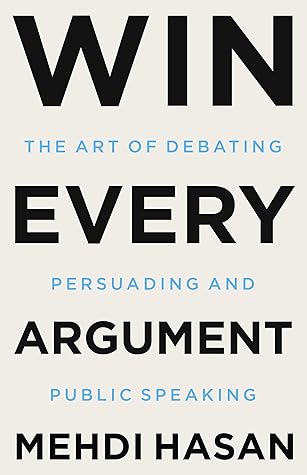More on this book
Community
Kindle Notes & Highlights
by
Mehdi Hasan
Read between
March 1 - March 5, 2024
First Lady Eleanor Roosevelt in her book You Learn by Living. “You are able to say to yourself, ‘I have lived through this horror. I can take the next thing that comes along’ … You must do the thing you think you cannot do.”
Another way to think of it is the “as if” technique. “If you want a quality,” noted William James, dubbed “the father of American psychology,” “act as if you already had it.”
This is one of the most important pieces of advice I can give you when it comes to public speaking: Do. Not. Wing. It. Prepare. Practice. Know that it takes time. But also know that you can get it right.
The inconvenient truth is that it doesn’t matter how clever, passionate, or eloquent you are—you cannot win an argument without putting in the work.
philosopher Patrick Stokes has observed, “You are not entitled to your opinion. You are only entitled to what you can argue for.”
“Every amazing creative thing you’ve ever seen or idea you’ve ever heard can be broken down into smaller ideas that existed before,” writes author Scott Berkun in his book The Myths of Innovation.
In my opinion, the simplest and surest way to lose an argument is to go into it with a set of views or opinions that you have not sufficiently challenged.
To get it right requires what is called “steelmanning”—an exercise in constructing the strongest version of your opponent’s argument.
What is your opponent’s best argument? What is their best evidence for that argument? Who is the best advocate for that argument? What is their best critique of your argument?
For Aristotle, an ideal peroration is “composed of four things”: It seeks to draw the audience in, “getting the hearer favorable to oneself, and ill-disposed toward the adversary.” It drives home the stakes of the argument, by what he calls “amplification and extenuation.” It makes one final appeal to pathos, “placing the hearer under the influence of the passions.” It summarizes the key points of your argument, thereby “awakening [the hearer’s] recollection.”


